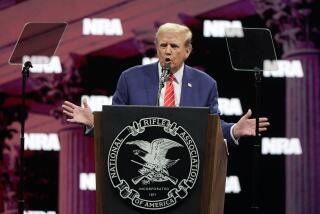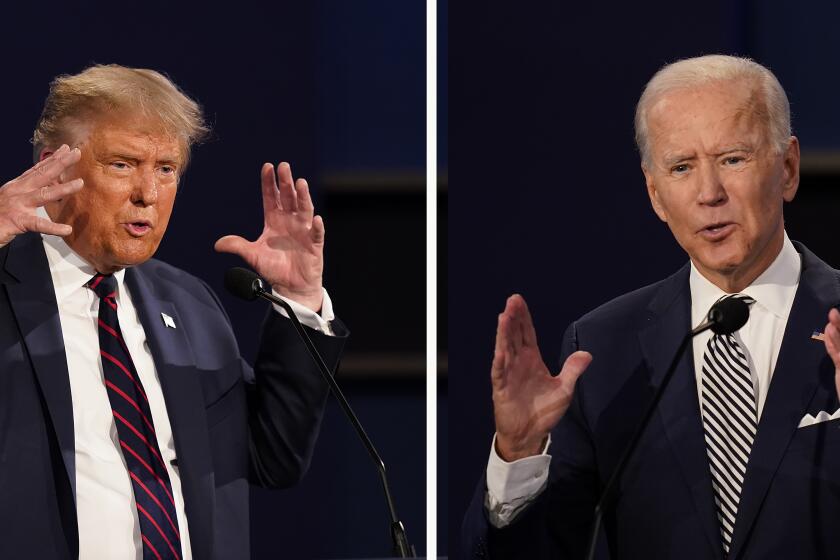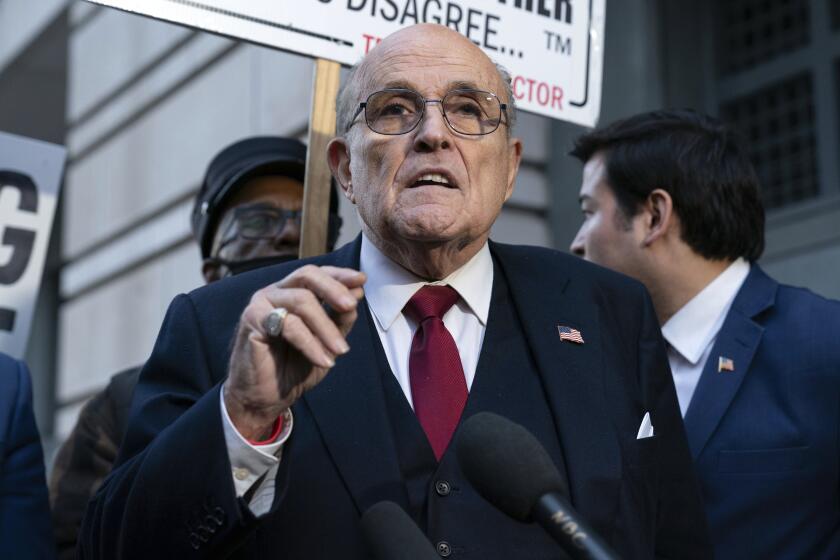Twice Discussed Overture Toward Iran, Shultz Says
Secretary of State George P. Shultz said Friday that he participated in two “full-scale discussions” of U.S. overtures to Iran at the White House--the last one occurring 10 days before President Reagan signed the secret order authorizing arms shipments to the Tehran regime.
Talking to reporters aboard his jetliner on the way to this snowy capital for talks with Canadian leaders, Shultz denied that he had asked Reagan to fire John M. Poindexter, the White House national security adviser and one of the chief architects of the arms sale to Iran.
Shultz was referring to a story in Friday’s editions of The Times, which, quoting Administration sources, reported that Shultz and Adm. William J. Crowe Jr., chairman of the Joint Chiefs of Staff, had called on Reagan to fire Poindexter for approving the shipment of arms to Iran.
In the story, the Administration sources noted that Shultz had vigorously opposed the operation and said he had been excluded from the January meeting that approved Poindexter’s plan for the shipment. Crowe is reported by the Pentagon not to have known of the arm shipments until they were disclosed in newspaper accounts this month.
On Friday, Shultz said, “That story is not true.”
The Times story reported that Shultz personally had told Reagan “Poindexter has to go,” according to a knowledgeable official. After rechecking Friday, The Times determined that it should have reported that Shultz has asked intermediaries to tell the President that “it’s either him (Shultz) or Poindexter,” according to the same official.
Neither Shultz nor his spokesman could be reached for further comment late Friday.
Of the Iran meetings, Shultz said, “There were discussions, and I participated in two of them that were full-scale discussions.”
Later, asked specifically whether he was present when a decision to send arms to Iran was made, Shultz declined to answer.
A Shultz aide said the two Iran meetings that Shultz attended were held Dec. 6, 1985, and Jan. 7, 1986. The December meeting followed by four months an Israeli arms shipment that the President was not informed of and did not approve, although one knowledgeable source said Israel received an authorized signal to proceed from a lower-ranking Administration official. The January meeting preceded Reagan’s action on Jan. 17 waiving the U.S. arms embargo against Iran.
‘Without Foundation’
In Washington, Crowe’s office issued a statement saying he was “aware of published news reports . . . that suggest that Adm. Poindexter should be replaced. Those reports are without foundation.”
“The chairman fully expects to continue his excellent working relationship with Adm. Poindexter in his current position,” the statement said.
Later, Capt. Jay Coupe, a spokesman for Crowe, said, “The chairman has had no communication with the President or anybody else in the government urging the replacement of Adm. Poindexter as the President’s national security adviser.”
However, a senior Administration official who asked not to be identified said Friday that Crowe is very unhappy about the Iranian mission and the way it was conducted by Poindexter. While Crowe may not have spoken directly to the President about dismissing Poindexter, the official said, Crowe has been outspoken in his criticism and had indicated he felt Poindexter should be replaced.
Critics Cite Opposition
Shultz’s opposition to the Iran arms shipment and the exclusion of other key officials from its planning have been cited repeatedly by critics who charge the operation was ill-considered and has left U.S. policy toward the Mideast in disarray.
Talking to reporters on the Canadian flight, Shultz insisted he had nothing to do with carrying out the arms shipments to Iran, which he has said he considered a mistake. And he added that because of White House concerns about secrecy, many people with important knowledge of the region were kept in the dark.
“When it comes to carrying something out, it is very hard to do it in the government if you have a lot of people involved,” he said. “If you want to carry it out in a secure way, you want to have a limited number of people involved. The greater the limitation, the less available to you are the talents in government that know about the subject.”
Shultz said he sent Under Secretary of State Michael H. Armacost to Capitol Hill on Friday to attend intelligence committee hearings at which CIA Director William J. Casey briefed key congressmen on the controversial operation.
To Listen, Not Testify
He said Armacost was there to listen--not to testify. “Armacost has been asked to be present, and one of the reasons for that is we want to know what is said,” Shultz said. “We are in the process of collecting information ourselves.”
Shultz said he assumed that the committees would prefer to question advocates of the policy because they are better informed than he about its details. But he said he is willing to testify “at the appropriate time and before the appropriate committee.”
Shultz refused to comment on former White House national security adviser Robert C. McFarlane’s assertion that the secretary of state was informed “repeatedly and often” about the Iran operation.
Shultz also turned aside with a firm rebuff a question about his reaction to White House officials who have called for his ouster because, they contend, the doubts he has expressed about Reagan’s policy have made it more difficult for the President to win public support. “I’m not going to get into a discussion of that subject at all,” he said.
But Shultz left little doubt that he is pleased with Reagan’s announcement Wednesday that there will be no more arms deliveries to Iran.
‘So That Is That’
Asked about his admission Sunday that he might not speak for the Administration on the Iranian arms issue, Shultz replied: “On Sunday, I said that it was my opinion that arms shipments to Iran should cease. The President said Wednesday that that is his view. So that is that.”
Shultz conceded that U.S. arms shipments to Iran, which has long been accused of backing terrorists, have damaged U.S. efforts to rally international support for programs to combat terrorism. But he said the anti-terrorism effort will continue despite the setback.
“State-supported terrorism is a major problem for us and for other countries,” he said. “These facts, unfortunately, have not changed. So we will continue in our efforts against terror, and the fact that the problem is so clear and so international in its scope is the final factor that leads people to cooperate with each other.”
Working Relatively Well
Shultz said the Administration is examining the relationship of the State Department and National Security Council in an effort to improve policy coordination. But he said the present system works relatively well.
“There is always in any administrative process a balance of considerations, but on the whole, I think it has gone off fine,” he said. “We are always examining these things to see if they can work better, . . . but my impression is that it has basically, across the board, been working well.”
Shultz’s visit to Canada was one of four meetings he has annually with Canadian External Affairs Minister Joe Clark. Although the Iranian controversy was discussed, the chief topic of the meeting was U.S.-Canadian relations.
More to Read
Start your day right
Sign up for Essential California for news, features and recommendations from the L.A. Times and beyond in your inbox six days a week.
You may occasionally receive promotional content from the Los Angeles Times.






